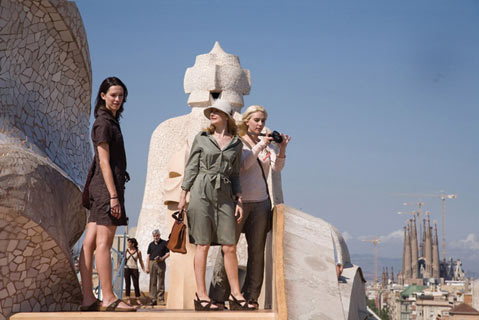Vicky Cristina Barcelona
Scarlett Johansson, Rebecca Hall, and Javier Bardem star in a film written and directed by Woody Allen.

Once past the traditional retirement age, Woody Allen finally started getting out of town. Out of New York, that is. After stubbornly basing most of his filmography within several miles of his home address, the Manhattanite, now 72, has within four years made three films in England (the excellent Match Point and the not-so-excellent Scoop and Cassandra’s Dream).
With the ripe and mostly enjoyable romantic jigsaw comedy Vicky Cristina Barcelona, Allen has even ventured into the land of a foreign tongue, Spain-a summer romp in Barcelona, to be exact. And like a good tourist, he makes sure to soak up the ambience. He layers in plenty of Spanish music (departing once again from his former obsession with the Great American Songbook) and allows the camera to lavish its attentions on Gaud- architecture and, of course, the various human architectural splendors of Vicky (Rebecca Hall) and Cristina (Scarlett Johansson).
In the complex math of the script’s romantic and existential plotting, the women are Americans summering in Barcelona and potentially in love or lust with a bohemian painter (Javier Bardem), whose plot is thickened by his heated and unresolvable relationship with his fiery ex-wife (Penelope Cruz). As he has before, Allen relies on the device of an omniscient narrator, the Greek chorus effect, to move the story along and give it an air of a saga retold in objective retrospect.
More to the point, for those inclined to place Allen films in the context of certain patterns and byways in his work, Vicky Cristina Barcelona belongs to the category made in homage to other directors. If Stardust Memories is his ode to Fellini and Interiors has Bergman written all over it, clearly, the homage here is to the iconoclastic Spanish director Pedro Almod³var. Of course, while Barcelona is sassier and sexier than much of Allen’s own past work, by Almod³var’s standard of kink (for both human activities and psychological cross-currents), Allen’s model is tame.
In the end, the characters are having seemingly life-clarifying adventures and quandaries on holiday, in a lovely, fleeting context. It’s only a summer abroad, and what happens in Barcelona may or may not stay there. And Woody Allen may or may not pay a return visit to the land of Gaud-, now that he’s got the travel bug.



